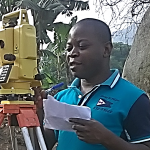News in 2021

|
FIG Foundation Ph.D. Scholarship awarded to Kehinde Babalola
January 2021
The Board of Directors of FIG Foundation found the application from
Kehinde Babalola, Nigeria, eligible for the FIG Foundation Ph.D. Scholarship 2020 for his Ph.D. research on: The Interactions
of Customary and Statutory Institutions and Laws: The Land
Administration System Process: A Case Study of Ekiti State, Nigeria.
Kehinde is studying at Division of Geomatics, Department of
Architecture, Planning & Geomatics, University of Cape Town, South
Africa.

This picture is taken In Ekiti State Nigeria while carrying out
a topographical survey. Ekiti State happens to be the case study
area for my current study.
|

This picture is taken on the mountain at a point called Devil’s
peak. There you have a Trig station where observations are made
to from University of Cape Town during practical works.
|
Kehinde explains about his research:
The topic of my PhD is land administration system (LAS) reform,
specifically to contribute to the debate in legal pluralism using
empirical evidence from a geomatics perspective. Hence peoples-based
approach will be adopted to interview respondents from customary and
statutory institutions in the land administration process. The
interviews are conducted to determine whether legal pluralism or legal
dualism exists in the legal framework of LAS in post-colonial African
countries. In this study three peri-urban case study areas were selected
to contribute to the evidence of this research. The study will further
understand LASs and land law within the general legal framework.
Identify existing and potential uncertainties in LAS. Propose theory
based on lesson learnt for understanding uncertainty in LAS. The study
will finally propose possible improvement based on the findings.
The study uses the 8Rs of responsible land management and
fit-for-purpose approach to analyse the existing legal framework for
LAS. The study will make use of documents from customary courts from the
three peri-urban areas. The analyses will be model using a system theory
of Soft System methodology for the social and political situation of LAS
in Ekiti state. The research further uses institutional isomorphism
theory to determine the legitimacy of the legal framework for LA. The
research is multi-disciplinary as it draws theories from engineering
science, social sciences and law.
A possible solution will then be proposed. Solutions will be proposed
drawing on multiple sources of data collected in several case studies.
Cases are chosen from Nigeria, where the problem is predominant. To
ensure reliability, the methodology employed multiple sources of
evidence. In-depth interviews (structured and semi-structured, archival
records, documents and participant observation are the proposed
techniques for primary and secondary data collection. In-depth
interviews are conducted to allow for an in-depth understanding of the
case. Empirical data will be collected using ‘people-based approach’
which involves direct interaction with the people and the process. Land
administration ministries and departments, customary institutions and
land right holders are selected for where interviews will be conducted.
This is because ministries and departments are responsible for formal
land administration while the traditional leaders are the custodian of
land in the customary areas and hence are responsible for customary land
administration. The collected data will be analysed using qualitative
analysis tools (NVivo 12). The recorded interview will be transcribed.
To ensure triangulation, the interview data will be verified against
documentary evidence. Internal validity will be ensured by sharing
interviews transcript with the interviewee to ascertain correctness.
Members of my research group will also scrutinize the methods and
results.
Congratulations to Kehinde - we hope to see and listen to Kehindes
research at the FIG Congress 2022
Louise Friis-Hansen
28 January 2021


























